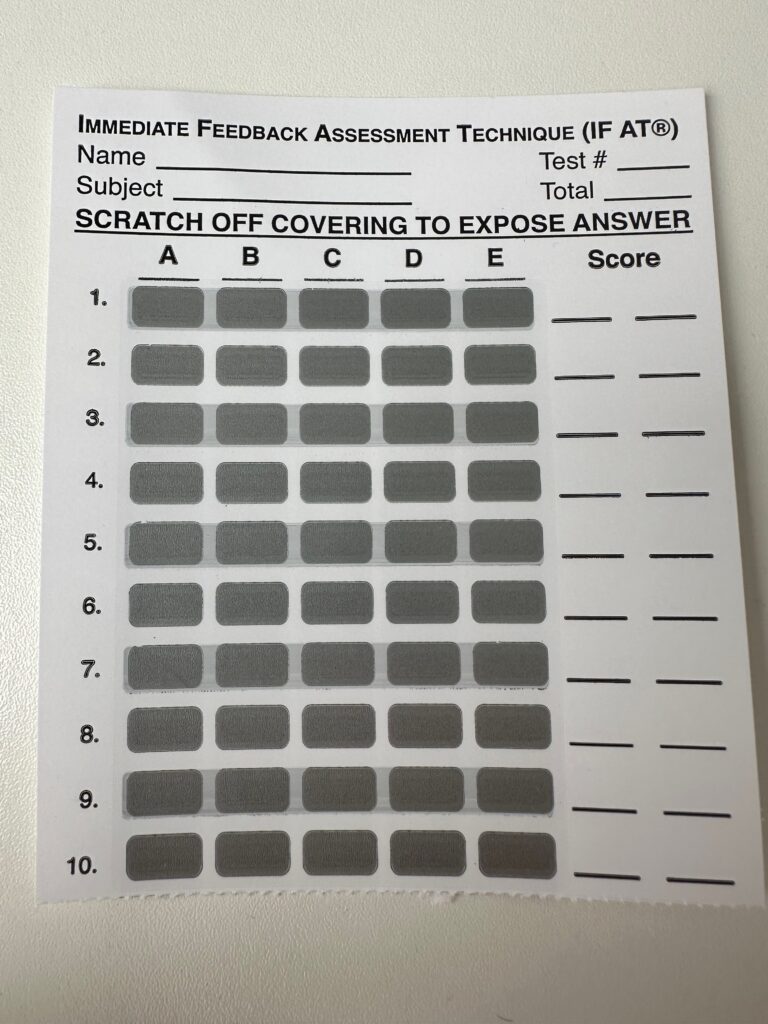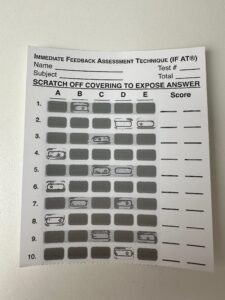Benjamin Bader (Senior Lecturer in International Human Resource Management)
Newcastle University Business School
Faculty of Humanities and Social Sciences
What did you do?
In the BUS3021 module International Human Resource Management, a stage 3 optional module in our N200 program, I incorporated an exciting and pedagogically sound twist to the traditional methods of teaching by employing the Immediate Feedback Assessment Technique (IFAT) scratch cards. This innovative approach combined the critical tenets of active learning and formative assessment, aiming to take student engagement and learning to the next level. The use of IFAT cards is a striking example of an assessment tool that goes beyond mere grading, aiming instead to improve the students’ learning process in real-time and contributing to engagement and fun in class. Collectively, this positively impacts the learning process and outcomes.
The IFAT scratch cards are used in conjunction with multiple-choice questions designed around the course content. Each question is accompanied by five possible answers, and the students’ task is to identify the correct answer. As in a lottery, with IFAT cards, students scratch off their selected answer on the card. If the scratched area reveals a star symbol, it means the chosen answer is correct. However, if the scratched area remains blank, it indicates that the selected answer was incorrect. Students then repeat the process, scratching another option until they uncover the correct answer marked by the star symbol.
This trial-and-error process allows students not only to confirm when they are correct, but also to learn from their mistakes when they are not. The immediate feedback offered by the IFAT cards encourages active learning and promotes a deeper understanding of the subject matter. Each card’s functionality essentially transforms a routine quiz into a dynamic learning experience.
Hence, an essential aspect of this technique was its ability to provide instant feedback, thereby enabling students to correct misconceptions and gain an accurate understanding of the topic at hand, effectively turning an assessment into a learning opportunity. Additionally, this active learning approach was designed to move students away from the passive intake of information to a more engaged, dynamic learning process where they could apply their understanding to solve problems.
Who is involved?
Dr Benjamin Bader, Senior Lecturer in International Human Resource Management and the students studying the BUS3021 module.
How did you do it?
Creating the IFAT scratch cards involved meticulously designing a multiple-choice test. Each question was intended to serve a dual purpose: to be enlightening and engaging while also challenging the students to think critically. The aim was not merely to test the students’ existing knowledge but also to provoke curiosity and build a keen interest in the course content. This creative combination of fun and complexity contributed to making learning enjoyable and stimulating.

A blank Immediate Feedback Assessment Technique sheet
A key strategy used in this process was the integration of questions that were linked to future course content. This was a deliberate move to plant the seeds of interest and intrigue in the minds of the students. Not only did this help in grabbing their attention from the onset, but it also meant that students would have several “Aha!” moments throughout the course when they encountered these concepts in greater detail. This interconnectedness added depth to the students’ understanding and fostered a sense of continuity in the learning journey.
In addition, these questions, which initially appeared to be fun and intriguing, were referred back to throughout the course. This acted as a constant reminder of their initial engagement and enjoyment, thereby reinforcing their understanding and encouraging them to view the learning experience as a cohesive narrative rather than isolated topics.
Why did you do it?
The motivation behind incorporating IFAT scratch cards into my teaching practice is deeply rooted in the pedagogical principles of experiential learning and constructivism. Experiential learning theory posits that students learn most effectively when they actively participate and reflect on their experiences. By actively engaging in the task of uncovering the correct answers, the students were living their learning experience, not just passively receiving knowledge. In fact, students do not only discuss the questions and solutions during the exercise but also afterwards, which further emphasises the learning effect.
The constructivist learning theory also informs this approach, viewing learning as an active and dynamic process where students construct new knowledge based on their existing knowledge and experiences. The students weren’t just memorising information; they were actively building on their understanding, thereby facilitating deep learning.
The urgency to captivate the interest of students from the very beginning has become a critical need in today’s educational landscape, where attention spans are dwindling and distractions are aplenty. By turning a traditional lecture into an active learning experience filled with anticipation and intrigue, we created an engaging learning environment that made the students look forward to every lecture.
The positive implications of employing these innovative techniques – along with critical discussions – are multifold. Not only do they help students develop a deeper understanding of the course content, but they also foster critical thinking, problem-solving, teamwork, and decision-making skills. For me as an educator, it provides the opportunity to witness the students’ learning journey first-hand and to facilitate their path towards becoming active learners and critical thinkers.
A noteworthy observation from this exercise was the heightened engagement of digital natives who, despite being born and raised in the age of technology, were thrilled by the tactile, non-digital experience of the IFAT scratch cards. In a world where almost every aspect of learning seems to be moving towards digitalisation, it was indeed fascinating to witness how the tangibility of the IFAT scratch cards could create such a buzz in the classroom. The sheer excitement of physically scratching the card to uncover the right answer added a unique element to the learning experience and was a refreshing change from the incessant screen time that the students were typically accustomed to.

A completed Immediate Feedback Assessment Technique sheet
Does it work?
The IFAT scratch cards method’s success is evidenced by the overwhelmingly positive feedback received from the students. They have explicitly mentioned in their course feedback how this technique has enriched their learning experience, emphasising its role in enhancing their understanding of the course material.
The positive student feedback is a testament to the effectiveness of the IFAT scratch cards in achieving the dual purpose of learning reinforcement and student engagement. The scratch cards have not only facilitated a deeper understanding of course content but have also significantly increased student participation and enthusiasm.
Furthermore, the students’ appreciation for this activity points to the broader issue of the importance of diversifying teaching methods. It underscores the need for higher education institutions to invest time and resources in developing innovative teaching and assessment methods that cater to the diverse learning preferences of the students. By focusing on enhancing the student experience, such methods can promote deeper understanding, greater retention, and ultimately, more enjoyable and effective learning environments.
The Graduate Framework
The project demonstrated the following attributes:
- Critical Thinkers
- Curious
- Collaborative
- Engaged
Want to know more?
If you would like to find out more, email Benjamin.Bader@newcastle.ac.uk who will be happy to share some IFAT scratch cards and talk about his experience of using them in his teaching.
Information about Benjamin Bader
Dr Benjamin Bader is a Senior Lecturer in International Human Resource Management. He received a Ph.D. degree with distinction from the University of Hamburg, Germany. His research interests include expatriate management, international leadership, and diversity management. A special emphasis of his research is on people management in hostile environments as well as the Future of Work. He has published several refereed journal articles as well as an edited volume on expatriate management. His articles appear in journals such as Human Resource Management, Journal of Management Studies, International Journal of Human Resource Management, Journal of Organizational Behavior, among others.
Benjamin has guest-edited several Special Issues and is currently serving as an Associate Editor at the International Journal of Human Resource Management. Having lived and worked in several countries, including the United States, Canada, Denmark, Germany, and the UK, he has first-hand experience of what it means to be an expatriate. This is also reflected in his teaching. Besides teaching at Newcastle University, he has been invited as a visiting professor or external lecturer at universities around the world, including Simon Fraser University (Canada) and Handelshochschule Leipzig (HHL, Germany). In 2016 he received the best teaching award from Leuphana University Lüneburg for a post-graduate seminar. In Newcastle, he was nominated for the prestigious The Education Awards 2019-2020 and shortlisted, among two other colleagues, in the Outstanding Contribution to Teaching – HaSS Faculty category and nominated again in the 2023 The Education Awards.
Benjamin also is a strategic advisor to and board member of the RES Forum, an independent community for international HR & mobility professionals that is now the largest and most active network, specialising in global mobility survey data, modelling and analytics. He is also an advisory board member of the Lean Group, Germany. Moreover, Benjamin is a certified LEGO(R) Serious Play facilitator and delivers both offline and online workshops. In order to increase the practical value of his research, he regularly publishes executive summaries and reports targeting practitioners. Moreover, his work has been featured in practitioner and media outlets, such as CNN, Reuters, ARD Tagesschau, People Management, HR Magazine, and the Financial Times.

Thank you for your research and summary conclusions regarding the benefits of the IF AT system. You have concisely and eloquently affirmed my belief in their educational value.
Michael L. Epstein
Epstein Educational Enterprises
Creator of Immediate Feedback Assessment Technique